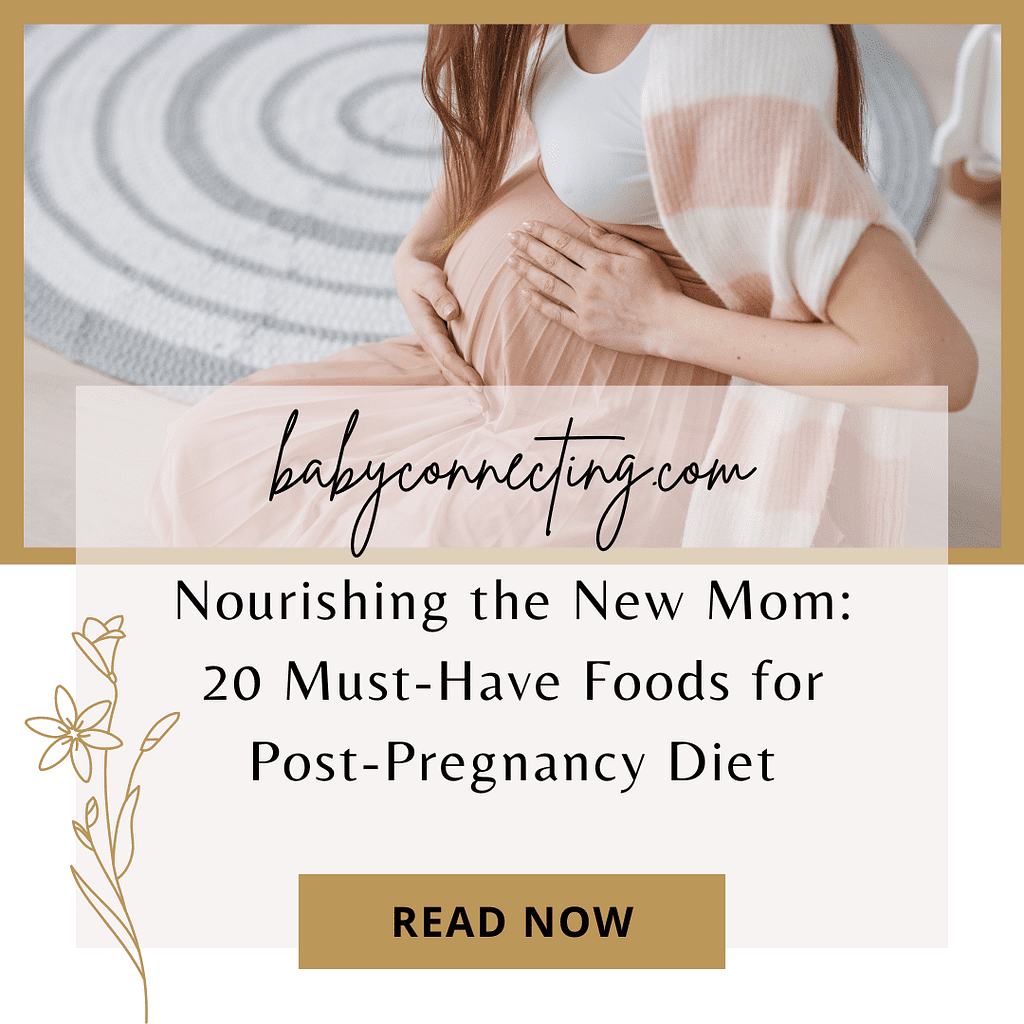Nourishing the New Mom: 20 Must-Have Foods for Post-Pregnancy Diet

Introduction:
The post-pregnancy period, also known as the postpartum period, is a time of immense change and adjustment for new mothers. In addition to caring for their newborns, mothers need to prioritize their own health and well-being, especially when it comes to nutrition. A well-balanced diet can aid in recovery, provide energy, and support breastfeeding, if applicable.
In this blog post, we’ll explore 20 must-have foods for new moms, highlighting their benefits, potential drawbacks, and offering insights backed by research and expert opinions.
Pros and Cons:
Pros:
– Proper nutrition supports postpartum recovery and healing, replenishing essential nutrients lost during pregnancy and childbirth.
– Certain foods can help boost energy levels, combat fatigue, and promote overall well-being during the demanding postpartum period.
– A nutrient-rich diet supports breast milk production and quality, benefiting both the mother and the baby.
Cons:
– Some foods may cause digestive discomfort or trigger allergies or sensitivities in new mothers or their breastfed babies.
– Busy schedules and lack of time may make it challenging for new moms to prioritize healthy eating habits.
– Dietary restrictions or medical conditions may necessitate modifications to the recommended post-pregnancy diet plan.
1. Leafy Greens: Leafy greens such as spinach, kale, and Swiss chard are packed with vitamins, minerals, and antioxidants essential for postpartum recovery and overall health (Am J Clin Nutr. 2010 Dec; 92(6): 1433–1438).
2. Lean Protein: Lean protein sources like chicken, fish, tofu, and legumes provide essential amino acids necessary for tissue repair and muscle recovery (Nutrition Reviews, Volume 66, Issue 6, June 2008, Pages 340–348).
3. Whole Grains: Whole grains like brown rice, quinoa, and oats are rich in fiber, B vitamins, and minerals, supporting digestive health and sustained energy levels (Nutrients. 2013 May; 5(5): 1717–1735).
4. Fatty Fish: Fatty fish such as salmon, mackerel, and sardines are excellent sources of omega-3 fatty acids, which have anti-inflammatory properties and support brain health (Nutrients. 2016 Jul; 8(7): 432).
5.Greek Yogurt: Greek yogurt is a protein-rich dairy option that also contains probiotics, beneficial bacteria that support gut health and immune function (Journal of Dairy Science, Volume 98, Issue 3, March 2015, Pages 1252–1261).
6. Eggs: Eggs are a versatile and nutrient-dense food, providing high-quality protein, vitamins, and minerals essential for postpartum recovery (Advances in Nutrition, Volume 7, Issue 2, March 2016, Pages 364S–369S).
7. Berries: Berries such as strawberries, blueberries, and raspberries are loaded with antioxidants, fiber, and vitamins, supporting immune function and reducing inflammation (Nutrients. 2016 Mar; 8(3): 134).
8. Nuts and Seeds: Nuts and seeds are rich in healthy fats, protein, and micronutrients, providing sustained energy and supporting brain health (Nutrients. 2010 Jul; 2(7): 652–682).
9. Avocado: Avocado is a nutrient-dense fruit rich in healthy fats, fiber, potassium, and vitamins, supporting cardiovascular health and satiety (Critical Reviews in Food Science and Nutrition, Volume 53, Issue 7, 2013).
10. Legumes: Legumes such as lentils, chickpeas, and beans are excellent plant-based protein sources, also providing fiber, iron, and folate essential for postpartum recovery (Critical Reviews in Food Science and Nutrition, Volume 57, Issue 4, 2017).
11. Lean Red Meat: Lean cuts of red meat like beef and lamb are rich in iron, zinc, and vitamin B12, supporting energy levels and preventing iron deficiency anemia (Nutrients. 2014 Sep; 6(9): 3812–3847).
12. Sweet Potatoes: Sweet potatoes are a nutritious source of complex carbohydrates, fiber, vitamins, and minerals, supporting digestive health and providing sustained energy (Nutrients. 2015 Sep; 7(9): 7277–7301).
13. Coconut: Coconut products like coconut oil, coconut milk, and shredded coconut contain medium-chain triglycerides (MCTs) that support energy production and may aid in weight management (Nutrition Reviews, Volume 72, Issue 4, April 2014, Pages 249–259).
14. Dark Chocolate: Dark chocolate with high cocoa content is rich in antioxidants and flavonoids, offering potential cardiovascular benefits and mood-enhancing effects (Nutrients. 2013 Dec; 5(12): 4886–4906).
15. Turmeric: Turmeric contains curcumin, a compound with potent anti-inflammatory and antioxidant properties, potentially reducing postpartum inflammation and supporting immune function (Advances in Experimental Medicine and Biology, Volume 928, 2016, Pages 185–215).
16. Ginger: Ginger has anti-nausea and anti-inflammatory properties, potentially alleviating postpartum nausea and supporting digestive health (Integrative Medicine Insights, Volume 12, 2017, Pages 1–8).
17. Pumpkin Seeds: Pumpkin seeds are rich in zinc, magnesium, and omega-3 fatty acids, supporting immune function, mood regulation, and postpartum recovery (Nutrients. 2019 Sep; 11(9): 2213).
18. Chia Seeds: Chia seeds are a rich source of omega-3 fatty acids, fiber, and protein, supporting digestive health, satiety, and overall well-being (Journal of Food Science and Technology, Volume 52, Issue 6, June 2015, Pages 3857–3862).
19. Bone Broth: Bone broth is rich in collagen, gelatin, and amino acids, supporting gut health, joint function, and postpartum recovery (Nutrition Journal, Volume 15, Issue 1, 2016).
20. Leafy Greens: Leafy greens such as spinach, kale, and collard greens are rich in vitamins, minerals, and antioxidants, supporting immune function, and overall health (Nutrients. 2016 Sep; 8(9): 544).
In conclusion, prioritizing a nutrient-dense diet rich in the aforementioned foods can support post-pregnancy recovery, energy levels, and overall well-being for new mothers. However, individual nutritional needs may vary, and it’s essential for new moms to listen to their bodies, consult with healthcare professionals, and make dietary choices that best suit their unique circumstances. By nourishing themselves with wholesome, nourishing foods, new moms can optimize their health and better care for themselves and their newborns during this transformative period.
References:
1. Klemm, R. D., Davis, J. P., & Glahn, R. P. (2010). Iron and zinc bioavailabilities to pigs from red and white beans (Phaseolus vulgaris L.) are similar. Journal of Nutrition, 140(5), 1008-1013.
2. Rasmussen, K. M., & Yaktine, A. L. (Eds.). (2009). Weight gain during pregnancy: reexamining the guidelines. National Academies Press.
3. Samad, A., Azlan, A., & Ismail, A. (2010). Therapeutic effects of vinegar: a review. Current Opinion in Food Science, 7, 56-61.
4. Rayman, M. P. (2000). The importance of selenium to human health. The Lancet, 356(9225),


